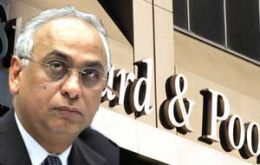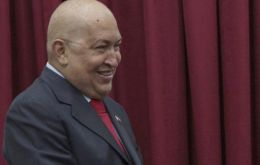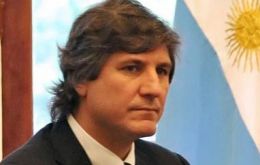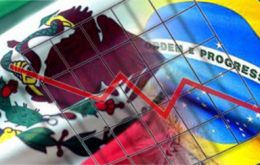MercoPress. South Atlantic News Agency
Economy
-
Tuesday, August 23rd 2011 - 06:36 UTC
Gold glitters on fear to an all time high of 1.910 dollars on Tuesday

Spot gold soared to an all-time high above 1,910 dollars on Tuesday, scoring a record top for a fourth consecutive session, as persistent worries about global economic growth burnished bullion's safe-haven appeal.
-
Tuesday, August 23rd 2011 - 06:33 UTC
After effects of downgrading US credit rating: KO for S&P president

Standard & Poor's (S&P) president Deven Sharma has stepped down just weeks after the agency downgraded the US credit rating. He will be replaced by Douglas Peterson, chief operating officer of Citibank with effect from 12 September, the agency said.
-
Monday, August 22nd 2011 - 07:32 UTC
In spite of global crisis, leading Spanish bank optimistic about Latam outlook

In spite of world turbulences the Latin America economy will expand 4.8% in 2011 and 4% in 2012 and 2013 boosted by the high price for commodities and strong domestic demand, according to the Spanish bank BBVA, on its “Latinamerica report”.
-
Monday, August 22nd 2011 - 07:22 UTC
Chavez health and ‘arbitrary laws’ make S&P downgrade Venezuela’s rating

US ratings agency Standard & Poor's downgraded Venezuela's foreign and local currency sovereign ratings by one notch Friday, citing the country's political risk as a credit weakness.
-
Monday, August 22nd 2011 - 07:19 UTC
Biden tells China US power not waning and anticipates a bumpy 2012

US Vice President Joe Biden rejected views that US power is waning and said Washington would never default, wrapping up a China visit that has played down tensions between the world's two biggest economies. He also anticipated 2012 was a ‘transition year” both for the US and China
-
Monday, August 22nd 2011 - 07:10 UTC
Venezuela has requested 99 tons of gold holdings from the Bank of England

Venezuela’s central bank has requested its 99 tons of gold holdings from the Bank of England, according to a bank statement sent by e-mail, citing the institution’s president Nelson Merentes.
-
Monday, August 22nd 2011 - 07:01 UTC
Argentina needs ‘no contingency or emergency plan’ to face the crises

Economy Minister Amado Boudou rejected the possibility that Argentina launches a brusque devaluation of its currency to make exports more competitive and insisted Argentina needs no emergency or contingency plan to face the challenge of the current crisis in the developed economies.
-
Monday, August 22nd 2011 - 06:55 UTC
Uruguay and Colombia have best ‘business climate’ in Latin America

Business climate remained stable in Latin America during the second quarter of the year in spite of signs of the incipient global financial crisis, according to the Brazilian Foundation and think-tank Getulio Vargas. Uruguay and Colombia led the pack of the most pro-business countries in the region.
-
Saturday, August 20th 2011 - 06:52 UTC
Latam markets follow world trend but fall less than the US and EU

Latin American stocks fell on Friday as deepening fears of a US recession and a wider financial crisis that could result from Europe's debt troubles kept investors cautious.
-
Saturday, August 20th 2011 - 06:45 UTC
Argentine industry says ‘inflation’ is main issue to address by next government

Argentina’s powerful Industrial Union (UIA) warned that if President Cristina Fernandez de Kirchner is re-elected next October one of the top issues of her agenda will be taking action in order to control “a concerning inflation”.
